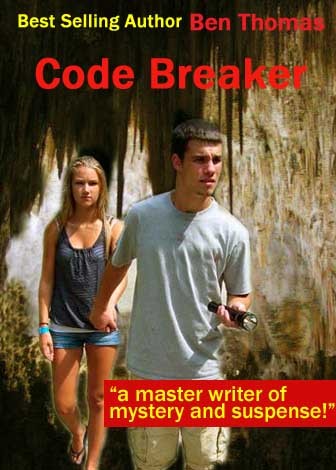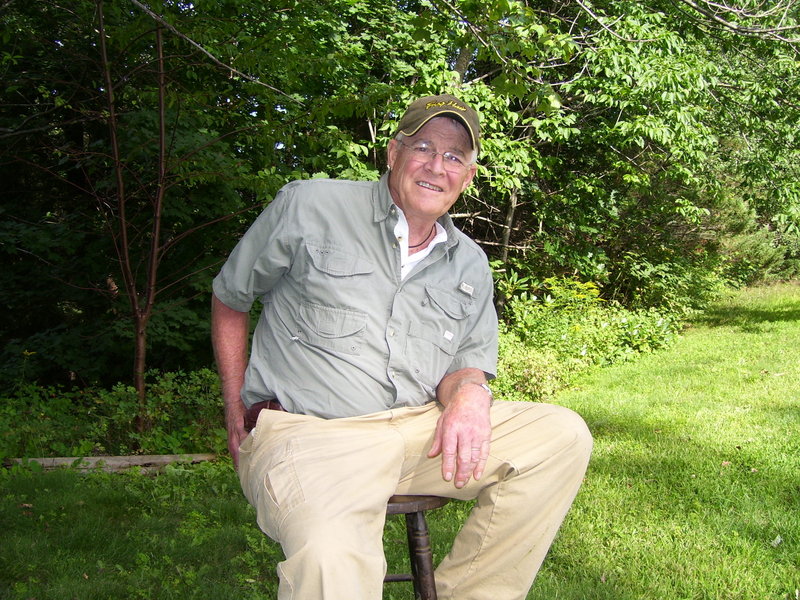Aconfluence of experiences and events produced “Code Breaker,” a novel for teenagers and young adults by Ben Thomas of Winthrop.
Thomas previously has written three books on canoeing — “No Horns Blowing,” “The Weekender” and “Hot Blood and Wet Paddles,” in addition to “Your Pocket Guide to the Maine Outdoors.” But he wanted to try fiction.
He spent a lot of time on Casco Bay while growing up in Yarmouth in the late 1940s and ’50s, where his father owned Yarmouth Boat Yard, and had heard a lot about activity in the area during World War II.
The result is an adventure novel with high school students as the main characters trying to solve a World War II code.
The “Code Breakers” is available locally at Mr. Paperback stores and Royal River Books in Yarmouth, and will soon be at other local bookstores. It also is available from the publisher, North Country Press in Unity, by calling 948-2208 or going to www.northcountrypress.com, as well as from national Web sites such as Amazon and Barnes & Noble.
Q: Why did you decide to write a young-adult book?
A: Probably because I was guidance director at the high school (in Winthrop) for 28 years and know about how they talked, their slang and that kind of thing. I’ve had some adults read it, and they liked it, sort of like you and I like the Harry Potter books.
Q: What was it like to switch from nonfiction to fiction?
A: Fiction is a whole lot harder, but it is also a whole lot more fun. Seven or eight years ago, a publisher contacted me and wanted me to update the whitewater canoeing book, and I said I didn’t want to do that. There are only so many ways that you can describe a rock. I wrote “the rocks stuck up like little islands of terror,” and that is about as close to fiction as I could get in those.
Q: In the publicity somewhere, it said there had been few young-adult books based in Maine. Did you ever read Lew Dietz’s Jeff White books?
A: Yes I did. I met him one time at a writers’ meeting. I wrote the canoe books, and he wrote that book “The Allagash,” and that was one of the things I got to experience.
And he wrote a lot of books. He said that you don’t set up to write a book. You get an idea and then you put it aside. And then you get another idea, and you put that aside. And when the pile is about a foot tall, you start working with it and then assemble it.
That is how “No Horns Blowing” came about. I had canoed a lot of rivers, and took notes so I would have them when I wanted to go out with my son. Then I mimeographed them and sold them for a quarter. Finally, a publisher saw that, and said let’s publish it, so we did.
Q: How did you come up with the idea for the “Code Breakers” plot?
A: I came to Maine in the eighth grade when my stepfather, Alex Twombly, purchased the Yarmouth Boat Yard. I worked in the yard during summer time, and had an outboard boat and all of Casco Bay when I was 14 or 15 years old.
My folks owned an 1880s cottage right on Casco Bay, directly across from Cousins Island. I hadn’t been in Maine three days when my aunt and I went down to the Cousins Island Bridge — the bridge wasn’t there in 1948 — and there were a bunch of what looked like telephone poles there, but they weren’t telephone poles. These were the remains of a submarine net strung across the channel to prevent German two-man submarines from getting inside the harbor.
I ran a canoeing club for a long time. We did 26 trips, and I feel good that we got done without anyone getting hurt. I taught with David Cook, who wrote a book on Indian canoe routes of Maine called “Above the Gravel Bar.”
He introduced me to Myron Smart in Milo, who made canoes, and he told me that during World War II there were three major German prisoner-of-war camps in Maine, and about how one time two of the prisoners escaped from one by Spencer Lake. Everyone in the area got their guns and went out to catch these guys. Two old guys sat by a bridge because they knew they would come that way, and they did, all bitten up.
So I put all of that stuff together — two-man subs, the prisoner of war camps and escapees, the towns around Freeport, a lot of landmarks like L.L. Bean, the Big Indian, the 1900s amusement park that burned in 1910.
So I had all of this stuff running around in my head, and I figured what would happen if I had a code from those escapees and had some present-day kids find it, and then I add some bad guys and see what happens.
Q: Do you have anything else in the works?
A: I have another book coming out, “Aristotle’s Gold,” which is a whole different kind of thing, without codes or anything. It involves sea urchin divers coming back with a gold pendant. I would say it is all done, but I want to read it one more time to adjust some things, maybe make the characters a little older.
And I have one planned called “Scorpion,” in which I go back to codes.
Tom Atwell can be contacted at 791-6362 or at:
tatwell@pressherald.com
Send questions/comments to the editors.




Success. Please wait for the page to reload. If the page does not reload within 5 seconds, please refresh the page.
Enter your email and password to access comments.
Hi, to comment on stories you must . This profile is in addition to your subscription and website login.
Already have a commenting profile? .
Invalid username/password.
Please check your email to confirm and complete your registration.
Only subscribers are eligible to post comments. Please subscribe or login first for digital access. Here’s why.
Use the form below to reset your password. When you've submitted your account email, we will send an email with a reset code.